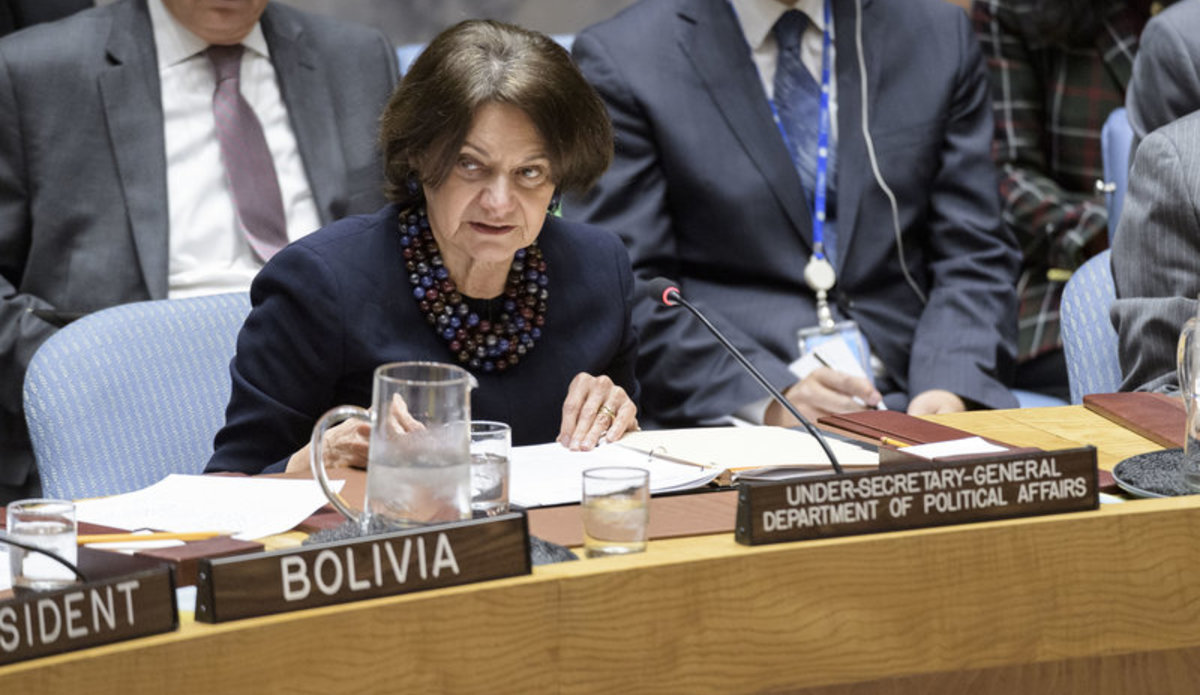Mr. President, Members of the Security Council,
Security Council resolution 2231 (2015) endorsed the Joint Comprehensive Plan of Action (JCPOA), which came into effect on 16 January 2016 (Implementation Day). The Secretary-General welcomed the Plan as a demonstration of successful multilateralism, and a major achievement of nuclear non-proliferation, dialogue and diplomacy. Last month, as it has done since Implementation Day, the International Atomic Energy Agency reported to this Council that Iran continues to implement its nuclear-related commitments.
Mr. President,
The Secretary-General welcomes the reaffirmation by JCPOA participants of their commitments to its full and effective implementation. It is essential that the Plan continues to work for all participants, including by delivering economic tangible benefits to the Iranian people. He regrets the re-imposition by the United States of its sanctions lifted pursuant to the Plan, after its withdrawal from the JCPOA. He believes that issues not directly related to the Plan should be addressed without prejudice to preserving the agreement and its accomplishments. At the same time, he calls on Iran to carefully consider and address the concerns expressed by Member States about its activities in relation to the restrictive measures contained in annex B to the resolution.
The Secretary-General notes that the Plan remains in effect and that the Security Council has called upon all Member States, regional and international organizations to support implementation of the Plan and to refrain from actions that undermine it.
Mr. President,
I thank you for the opportunity to brief the Security Council on the sixth report of the Secretary-General on the implementation of resolution 2231 (S/2018/1089). As guided by the Security Council, and consistent with our previous reports, the one before you today is focused on annex B to the resolution.
First, on the implementation of the nuclear-related provisions, the Secretariat has received additional information on two dual-use items destined for Iran, which were seized by the United Arab Emirates. The manufacturing States of these items informed the Secretariat that, in their assessment, they did not require prior approval by the Security Council through the procurement channel process. In addition, the Secretariat continues to examine information related to the possible transfer of the other items, undertaken contrary to the resolution, which were brought to its attention by the United Arab Emirates and the United States.
It is our assessment that the procurement channel remains a vital transparency and confidence-building mechanism. It ensures that the transfers of certain goods, technology and/or related services to the Islamic Republic of Iran are consistent with resolution 2231 and the Plan. Since January 2016, 42 proposals have been submitted to the procurement channel, of which twenty-eight (28) have been approved. The Secretary-General encourages all States and the private sector to fully utilize and support this channel.
Second, on the ballistic missile-related provisions, the report reflects information provided to the Secretary-General and to the Security Council by France, Germany, Iran, Israel, the Russian Federation and the United Kingdom on additional ballistic missile flight tests reportedly conducted by Iran since January 2018, as well as on the launch of several ballistic missiles at targets in Syria on 1 October 2018. As you know, the Security Council met on 4 December 2018 to consider the reported test firing of a further medium-range ballistic missile by Iran on 1 December 2018.
Since our last report, the Secretariat examined the debris of three more ballistic missiles launched at Riyadh by the Houthis in March and April 2018. Those debris were consistent with that of the five missiles examined previously, which the Secretariat assessed share key design features with the Iranian Qiam-1 ballistic missile and had components parts manufactured in Iran. However, the Secretariat has not been able to determine whether such missiles, or parts thereof, or related technology, were transferred from Iran after 16 January 2016, the date when annex B provisions came into effect.
Third, in terms of the arms-related provisions, during the reporting period, the Secretariat examined two container launch units for anti-tank guided missiles recovered in Yemen. The Secretariat found that they had characteristics of Iranian manufacture and that their markings show production dates in 2016 and 2017. The Secretariat also examined a partly disassembled surface-to-air missile seized by the Saudi-led coalition and observed that its features appeared to be consistent with those of an Iranian Sayyad-2C missile. The Secretariat is still analyzing available information on additional unmanned aerial vehicles recovered in Yemen, including some which appear to have the same design features as the Iranian-made Ababil-2.
The report also reflects that the Secretariat examined a shipment of about 2,500 assault rifles seized by the United States in the Gulf of Aden in August 2018. The Secretariat observed that these weapons did not have the characteristics of Iranian production. The Secretariat will further analyze this seizure should new information become available, and report back accordingly. In addition, the report includes information received from Israel and Iran regarding the alleged transfer of an Iranian-produced Kordad air defence system to the "T4 airbase" in Syria in April 2018.
It also highlights the continued participation of Iranian entities in another foreign arms exhibition held in Baku, Azerbaijan, in September 2018. In relation to the travel ban provisions, the report provides additional information on a previous travel by Major General Qasem Soleimani to Iraq in May 2018.
Mr. President,
In closing, I would like to thank His Excellency Ambassador Karel van Oosterom (Netherlands) for his tenure as Facilitator for the implementation of resolution 2231 (2015). I would also like to take this opportunity to congratulate His Excellency Marc Pecsteen de Buytswerve (Belgium), who will assume the functions of Facilitator on 1 January 2019, and to assure him of the Secretariat’s full support. I would also like to thank the Coordinator of the Procurement Working Group of the Joint Commission for our continued cooperation.
Thank you, Mr. President.

